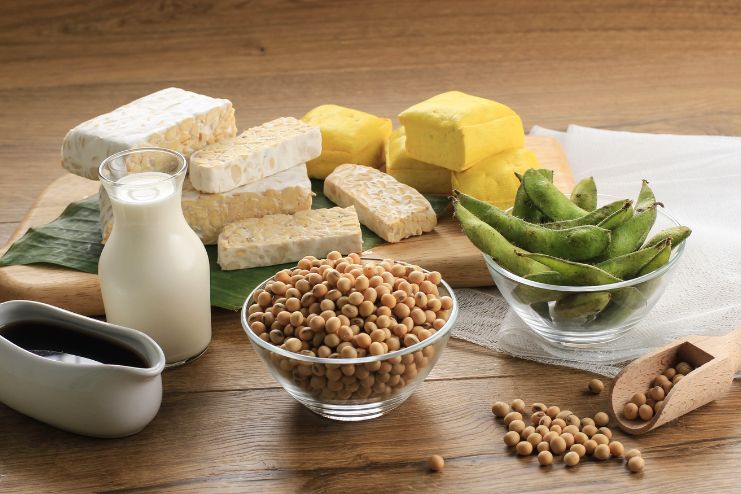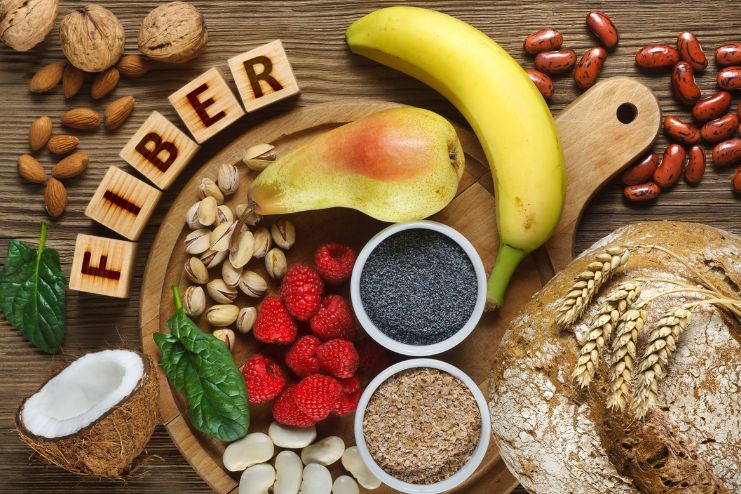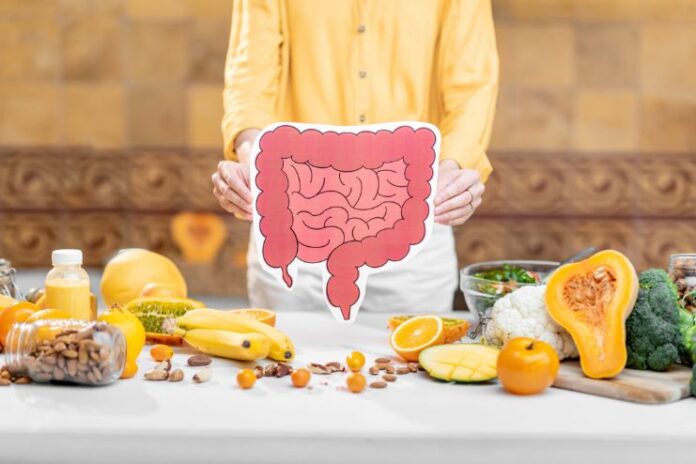A healthy gut is the cornerstone of general well-being and goes beyond simply having a contented stomach. Your diet significantly impacts gut health, affecting everything from immunity and mental clarity to digestion and nutrient absorption. A well-rounded diet is crucial for maintaining the health of the gut microbiome, which is home to trillions of microorganisms within your digestive system.
Nutrients such as fiber, probiotics, and antioxidants play a vital role in nourishing these beneficial microbes. This nourishment helps to reduce inflammation, promote healthy bowel movements, and strengthen the immune system.
On the other hand, an unhealthy diet heavy in processed foods and sugars can upset this equilibrium, causing digestive problems as well as a host of other health issues like mood swings, skin disorders, and exhaustion.
Making better food choices that support digestion and improve your energy, immunity, and general quality of life begins with understanding the strong connection between diet and gut health.
Read More: Gut Health Hacks: The Best Morning Foods to Kickstart Digestion
Understanding Gut Health and Its Importance
The gut’s “brain” is reshaping our understanding of how interconnected digestion, mood, overall health, and even mental processes are. Dr. Omar Khokhar, a gastroenterologist with OSF HealthCare, explains, “We have a cerebral brain, but we’re realizing that our gastrointestinal system (GI) has its own brain.” This suggests that the way your digestive system operates has far-reaching effects on other bodily functions. Serving as the central organ that supplies essential nutrients to the rest of the body, gut health plays a critical role in overall well-being.
When the balance between beneficial and harmful bacteria and yeast in the digestive tract is maintained, gut health thrives. With most of your body’s serotonin and 80% of your immune system residing in the gut, poor gut health can lead to hormonal imbalances and weakened immunity, making you more susceptible to illness.
The gut breaks down all food into a simple form that travels through the bloodstream and distributes nutrients throughout our bodies. A properly functioning and healthy digestive system is essential for this.
Immune cells and beneficial bacteria in a healthy gut help fight off pathogens, including viruses, bacteria, and fungi. Additionally, a healthy stomach maintains general health and your well-being by communicating with the brain through hormones and neurons.
A well-functioning gut is essential for optimal digestion, efficient metabolism, and a strong immune system, all of which are fundamental to overall health and vitality. Meanwhile, a number of illnesses, including irritable bowel syndrome, inflammatory bowel disease, allergies, and mental health issues, have been connected to poor gut health.
Factors Affecting Gut Health

To keep your gut healthy, you must eat nutritious food occasionally and make various lifestyle decisions that affect how well your digestive system works. These are some critical variables that impact intestinal health.
Stress can lead to increased intestinal permeability, often referred to as a leaky gut, disrupting the balance between harmful and beneficial bacteria in the digestive system.
High Sugar Intake: Excessive sugar intake, particularly refined sugars, can result in an imbalance in gut flora. It encourages the growth of dangerous yeasts and bacteria, which can cause digestive problems and inflammation.
Extended usage of Antacids and Antibiotics: They deplete the gut’s supply of B12, which is necessary for energy production, cognitive function, and cell formation. They also destroy your gut’s beneficial microorganisms. But it’s crucial to remember that these drugs have their place and time, and it’s better to speak with your doctor before taking them.
Absence of Fiber: Good gut bacteria use fiber as fuel. Diets deficient in whole grains, legumes, fruits, and vegetables might starve good bacteria and impair healthy digestion.
Aids in Digestion: Water plays a key role in helping break down food and ensures efficient nutrient absorption. Maintaining proper hydration helps prevent constipation and ensures that your bowel movements remain regular and effortless.
Inadequate Fermented Foods: Probiotics in foods like yogurt, kefir, sauerkraut, and kimchi help preserve a balanced population of intestinal microorganisms.
Read More: Can You Heal a Leaky Gut Naturally? Science-Backed Solutions for Better Gut Health
Foods for a Healthy Gut
Section A: Prebiotic-rich Foods

Prebiotics are compounds from plant-based foods that nourish your body’s beneficial flora. Prebiotics nourish the beneficial bacteria in the gastrointestinal (GI) tract, supporting their growth and helping to maintain a healthy gut environment.
Many plant-based foods naturally contain prebiotics. It covers specific fruits, vegetables, whole grains, and legumes.
Cereals, bread, and snack meals are processed foods that frequently contain prebiotic elements. Inulin, wheat dextrin, acacia gum, psyllium, polydextrose, GOS (galactooligosaccharides), FOS (fructooligosaccharides), and TOS (transgalactooligosaccharides) are some of the terms you may encounter on food labels.
What Advantage Does It Offer?
Healthy bacteria obtain energy from the breakdown of prebiotics. As a result, they are more likely to survive in the gut, and we benefit from the byproducts they create.
A diet abundant in prebiotic foods plays a crucial role in promoting and strengthening the overall health of your digestive tract. It accomplishes this by enhancing immunological function, facilitating food absorption, and improving digestion.
Foods that naturally include prebiotic fibers also offer several health advantages by providing vitamins, minerals, and other nutrients.
Prebiotics are found in Foods:
- Almond flour-based baked items, almond butter, and whole almonds.
- Mix fresh bananas into frozen banana “ice cream” and add them to breakfast, banana bread, and smoothies.
- Bread, crackers, tortillas, breakfast cereals, and whole wheat pasta are excellent sources of whole grains that contribute valuable fiber and essential nutrients to a gut-friendly diet.
- Flax seeds can also be added to baked food, smoothies, and porridge.
- Miso, tempeh, soymilk, and tofu are soy-based foods that can support gut health, especially when fermented. They provide beneficial prebiotics and plant-based nutrients.
- Sauerkraut, cabbage slaw, and cabbage can be used as wraps in place of tortillas, stir-fried, or added to soup for a crunchy, low-carb boost packed with fiber and nutrients.
- Add raw garlic to salads, guacamole, salsa, fresh dressings, and olive oil to add taste.
- Raw leafy greens, such as radicchio, endive, dandelion, and leek, can be added to salads, garnished, or blended into smoothies for a bitter, nutrient-rich punch.
- Oat cereal, oatmeal cookies, granola, granola bars, and oatmeal can be enjoyed as a hearty breakfast, a quick snack, or a wholesome ingredient in baking for sustained energy and heart-healthy fiber.
- Incorporate thin slices or grated asparagus into the salad and present it alongside a plate of fresh, raw vegetables. Serve on a dish of raw vegetables.
Read More: Is Your Morning Coffee Sabotaging Your Gut Health?
Section B: Probiotic-rich Foods

When taken in sufficient quantities, probiotics—live microorganisms, primarily bacteria and some yeasts—produce health benefits. These “good” bacteria support your digestive system’s correct balance and operation.
Advantages of using Probiotics:
- Replaces microorganisms lost due to antibiotics, disease, and bad diet, increasing beneficial bacteria.
- Strengthens your immune system and intestinal lining by increasing the body’s capacity to fight infections.
- Reduces dangerous germs by releasing chemicals that kill them and generating an acidic atmosphere.
Probiotic-containing Foods include:
- Incorporate kefir cream or yogurt into homemade popsicles and smoothies.
- You can steam, marinate, and use chunks or crumbles of tempeh (soy) instead of meat in various recipes, including pot pies, spaghetti, and barbecue sauce.
- Cottage cheese, aged cheese, and sour cream can be used as toppings, added to dishes for extra creaminess, or enjoyed on their own for a savory, protein-packed snack.
- Acidophilus milk, buttermilk.
- Pickles, kimchi, and sauerkraut.
Section C: Fiber-rich Foods

Fiber is essential for maintaining the health of your digestive tract. It feeds the good bacteria in your colon, encourages regular bowel movements, and gives feces more volume. Fiber comes in two varieties:
Soluble Fiber helps regulate digestion by forming a gel-like substance when it dissolves in water, which also supports balanced blood sugar levels and cholesterol management.
Insoluble Fiber helps move the food through the digestive tract and gives the stool more volume.
Fiber’s Health Benefits:
Prevents Constipation
Reduces the chance of colon cancer
Encourages satiety, which helps with weight control.
Top Foods High in Fiber for Gut Health:
- Black beans are very rich in fiber, and they are also a good source of polyphenols—antioxidants that promote the health of your gut.
- In addition to being delicious, raspberries are high in fiber because of their seeds. They are also low in sugar but packed with vitamin C and a rich array of antioxidants.
- Barley, brown rice, quinoa, oats, and whole wheat are very good sources of both soluble and insoluble fiber.
- In addition to being a rich source of healthy fats and fiber, avocados are higher in fiber than most other fruits and vegetables, promoting metabolic health.
- Chia seeds are among the most fibrous, with around 34g of fiber per 100g. Incorporating a mix of seeds and nuts into both savory and sweet dishes is a great way to enhance your fiber intake.
- Kale contains various vitamins and antioxidants that can support overall gut health. Consuming cooked kale provides a higher fiber content compared to its raw counterpart, as cooking reduces its volume, allowing for more fiber in the same portion.
- In addition to being very high in fiber, sweet potatoes are also a good source of vitamin A, which promotes eye and immune health.
Read More: 10 Signs Your Gut Health Needs Attention (And How to Fix It)
Lifestyle Tips for Improved Gut Health
Your lifestyle significantly impacts gut health, so it’s not just about what you eat. One of the most crucial lifestyle elements is listed below:
Digestive discomfort is a common sign of increased stress. Stress raises our cortisol and adrenaline levels, which can result in symptoms like heartburn, diarrhea, constipation, and stomach pain. Due to the powerful connection between the gut and brain, we often experience butterflies in our stomachs before a major presentation or feel uneasy in stressful, high-pressure moments.
According to published research, specific gut bacteria may affect your sleep, including how likely you are to experience insomnia, how often you need to take naps, and how long you stay asleep at night.
A recent in-depth study reveals that committing to 150–270 minutes of moderate to vigorous exercise each week for a minimum of six weeks can enhance gut microbiota, particularly when paired with both aerobic workouts and strength training.
Read More: Why Probiotics Might Not Work Without Prebiotics: How to Maximize Gut Health
Conclusion
A healthy digestive system is the foundation of general wellness, and diet is essential to preserving its equilibrium. The foods you eat directly impact the diversity and robustness of your gut microbiome by ensuring a high dietary fiber intake and providing your gut with prebiotics and probiotics. In addition to facilitating digestion, a healthy gut improves immunity, mental acuity, and emotional regulation.
Beyond diet, other lifestyle choices that promote digestive health include stress management, regular eating, and physical activity. These modest but persistent efforts can pay off handsomely in the long run.
You enable your body to perform at its peak by prioritizing gut-friendly meals and healthy daily routines. Your health journey can be transformed by making thoughtful decisions now, starting in your gut and spreading throughout your entire body.
References
- https://wexnermedical.osu.edu/our-stories/everything-you-need-to-know-about-gut-health
- https://www.ama-assn.org/delivering-care/public-health/what-doctors-wish-patients-knew-about-improving-gut-health#
- https://www.frontiersin.org/journals/nutrition/articles/10.3389/fnut.2021.644138/full
- https://my.clevelandclinic.org/health/body/25201-gut-microbiome
- https://www.healthline.com/health/gut-health#foods-for-gut-health
- https://www.ars.usda.gov/oc/utm/keeping-a-healthy-gut/
- https://www.chop.edu/health-resources/food-medicine-prebiotic-foods
- https://www.healthline.com/nutrition/11-super-healthy-probiotic-foods
- https://www.chop.edu/health-resources/food-medicine-probiotic-foods
- https://www.vogue.com/article/fiber-rich-foods
- https://www.eatingwell.com/article/8044305/best-high-fiber-vegetables/
- https://www.health.harvard.edu/staying-healthy/5-simple-ways-to-improve-gut-health
In this Article



















